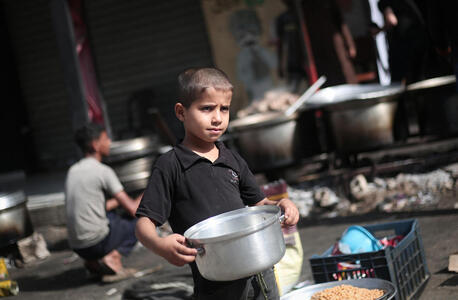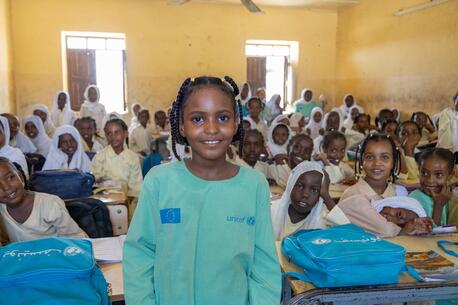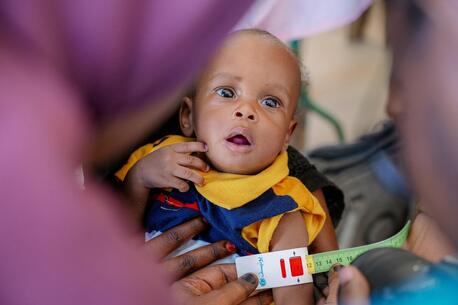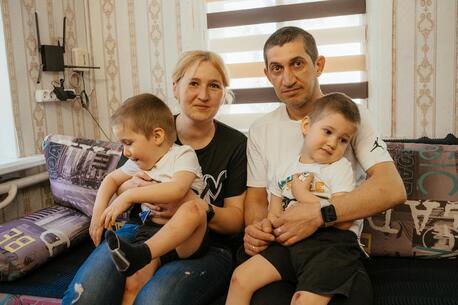
With Gaza at Risk of Famine, UNICEF Keeps Delivering for Children
As the conflict in Gaza continues, needs are intensifying for children and families. An update on the UNICEF response.
Mass displacement, overcrowding, water and sanitation services near collapse
After almost 80 days of fighting, up to 1.9 million people in the Gaza Strip are now displaced — nearly 85 percent of the population, half of whom are children, according to UNICEF's latest situation report. Families fleeing violence are crowded into Rafah Governorate in southern Gaza — over 12,000 people per square kilometer.
Water, food, fuel and medicine are all in short supply. Thousands of people queue daily at aid distribution centers. There is a lack of latrines and adequate water and sanitation facilities in informal displacement sites and makeshift shelters.
With the onset of cold winter weather, and with recent rains flooding tents and other makeshift shelters, conditions have continued to worsen, heightening concerns of large-scale disease outbreaks. Shelters supported by the United Nations Relief and Works Agency for Palestine Refugees in the Near East (UNRWA) have reported 360,000 cases of infectious diseases, including acute respiratory infections, meningitis, jaundice, impetigo and chickenpox.
Every child under age 5 in Gaza — 335,000 children — is in urgent need of help right now. And UNICEF is there, doing what it can to help as many of them as possible.
UNICEF continues to do what it can to get aid to children in Gaza
UNICEF is focusing on reaching children and families who are struggling to survive increasingly dire conditions, which include a high risk of famine for the area. UNICEF staff, alongside UN and civil society partners, remain in Gaza, working to meet critical needs for protection and humanitarian assistance — but access remains difficult and dangerous.
Two hospitals in southern Gaza recently received 4,000 blankets from UNICEF. Watch the video:
Between Dec. 14 and Dec. 20, 35 UNICEF trucks entered Gaza with hygiene kits, bottled water, medical kits, warm winter clothing, tents and tarpaulins and other critical emergency supplies, including:
- lipid-based nutrition supplements to meet the needs of 61,600 children aged 6-24 months who are inside shelters in the Gaza Strip for one month
- a supply of Ready-to-Use Therapeutic Food to treat 3,000 children suffering from acute malnutrition
- micronutrient supplements for 1,660 pregnant and breastfeeding women
- Vitamin A supplements for 3,370 infants aged 6-11 months
UNICEF also provided 80,000 liters of fuel to run wells and desalination plants supplying safe drinking water to 1.3 million people, including over 676,000 children.

Since Oct. 21, a total of 220 UNICEF trucks have entered Gaza, and UNICEF has reached tens of thousands of children and women with emergency services and support, including:
- 4,759 high-risk pregnant women with medical assistance and 21,499 pregnant women with iron folate or multiple micronutrient supplements to prevent malnutrition
- 41,008 children and caregivers with emergency and child protection services
- 24,450 children with recreational activities to support their well-being
For week-by-week, detailed accounts by UNICEF program area and associated funding needs, visit unicef.org.
"When I think about what UNICEF usually provides in crises — water, protection, nutrition services, education, psychosocial support, all of these children [in Gaza] need — absolutely every single one of them," UNICEF Spokesperson Joe English said. "But we can't begin to deliver at the scale that is necessary until there is a pause in the fighting."
UNICEF continues to call for an immediate and long-lasting ceasefire, so that humanitarian actors can support the strengthening and restoration of essential services across the Gaza Strip, allowing vulnerable children to meet their basic nutrition and health needs, and for the release of all hostages.
Support UNICEF's mission of responding to emergencies impacting children around the world. Donate today.
HOW TO HELP
There are many ways to make a difference
War, famine, poverty, natural disasters — threats to the world's children keep coming. But UNICEF won't stop working to keep children healthy and safe.
UNICEF works in over 190 countries and territories — more places than any other children's organization. UNICEF has the world's largest humanitarian warehouse and, when disaster strikes, can get supplies almost anywhere within 72 hours. Constantly innovating, always advocating for a better world for children, UNICEF works to ensure that every child can grow up healthy, educated, protected and respected.
Would you like to help give all children the opportunity to reach their full potential? There are many ways to get involved.





